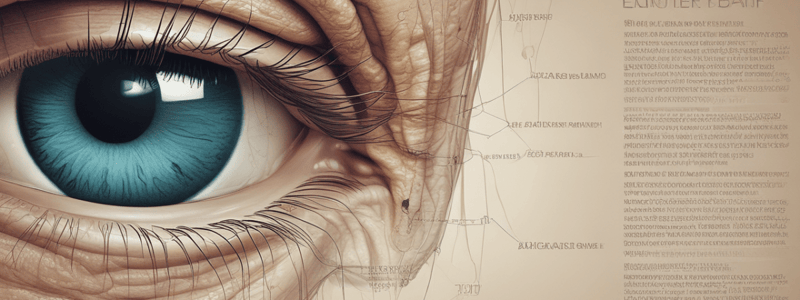Podcast
Questions and Answers
What is the primary function of the parasympathetic nervous system in relation to the lacrimal gland?
What is the primary function of the parasympathetic nervous system in relation to the lacrimal gland?
- Secretion of tears (correct)
- Regulation of emotional crying
- Control of blood supply to the lacrimal gland
- Production of adrenaline
Which neurotransmitter is involved in stimulated secretion by the lacrimal gland?
Which neurotransmitter is involved in stimulated secretion by the lacrimal gland?
- Acetylcholine (correct)
- Norepinephrine
- Dopamine
- Serotonin
What is the primary cause of the blink reflex in response to tear film evaporation?
What is the primary cause of the blink reflex in response to tear film evaporation?
- Dryness of the corneal surface
- Hypertonicity of the tear film (correct)
- Increased pressure gradient in the drainage system
- Hypotonicity of the epithelial cells
What is the role of the trigeminal ganglion in relation to tear production?
What is the role of the trigeminal ganglion in relation to tear production?
During the closing phase of a blink, what happens to the canaliculi and sac?
During the closing phase of a blink, what happens to the canaliculi and sac?
What is the difference between tears produced during emotional crying and tears produced to simply moisten the eye?
What is the difference between tears produced during emotional crying and tears produced to simply moisten the eye?
What is the role of the hypothalamus in relation to tear production?
What is the role of the hypothalamus in relation to tear production?
What is the purpose of the Schirmer test in assessing tear production?
What is the purpose of the Schirmer test in assessing tear production?
What is a common problem with the Tear Breakup Time (BUT) test?
What is a common problem with the Tear Breakup Time (BUT) test?
Which nerve is responsible for relaying sensory information between the cerebellum and cerebrum?
Which nerve is responsible for relaying sensory information between the cerebellum and cerebrum?
What is the effect of the parasympathetic nervous system on the heart rate?
What is the effect of the parasympathetic nervous system on the heart rate?
What is the advantage of using Rose Bengal Stain in assessing the tear film?
What is the advantage of using Rose Bengal Stain in assessing the tear film?
What is the effect of age on tear production?
What is the effect of age on tear production?
What is the role of G proteins in stimulated secretion by the lacrimal gland?
What is the role of G proteins in stimulated secretion by the lacrimal gland?
What is the mechanism by which the drainage system is driven?
What is the mechanism by which the drainage system is driven?
What is the purpose of the paper tabs in assessing the tear film?
What is the purpose of the paper tabs in assessing the tear film?
Flashcards are hidden until you start studying
Study Notes
Blinking and Tear Film
- We blink due to the evaporation of tear film, which leads to hypertonicity (high salt concentration) and draws water from epithelial cells, causing a slight sting that triggers a blink to restore isotonicity.
The Drainage System
- The drainage system is driven by pressure gradients, with three stages:
- Before blinking, the system is open, and canaliculi are filled with approximately 1.5 μl fluid, with no pressure gradient.
- During the closing phase, puncta meet and close, compressing canaliculi and sac, increasing pressure, and fluid moves into the duct.
- During reopening, the sac and canaliculi re-expand, creating a negative pressure in the sac, and fluid flows into puncta and canaliculi.
Assessing Tear Film Condition
- The Schirmer test is used to assess tear production, with paper tabs inserted into the lower lids and removed after 5 minutes; less than 10 mm wetting is considered abnormal.
- Topical proparacaine hydrochloride anaesthesia reduces mean tear flow rate by 40% and prevents tearing due to irritation from the paper.
Tear Breakup Time (BUT)
- Tear Breakup Time (BUT) measures the time the eye can be kept open before the tear film ruptures spontaneously.
- The test is performed by treating the eye with fluorescein and scanning the tear film with cobalt blue light; the endpoint is recorded when a dry spot appears.
Problems with BUT
- Uneven mixing of fluorescein, unknown fluorescein concentration, and lag time between appearance of a dry spot and its discovery by the observer are potential problems with the test.
Nervous Involvement in Tears
- Tears can be secreted as a reflex response to various stimuli, including thermal stimuli, irritation of the cornea or conjunctiva, peppery foods, bright light, coughing, yawning, vomiting, and emotional upset.
- Tears produced above the resting level have more aqueous and less protein content.
- Lacrimal cells are under the influence of the hypothalamus, which is involved in controlling emotions and sexual activity.
Autonomic Nervous System
- The sympathetic nervous system (SNS) activates the "fight or flight" response, involved in producing adrenaline and controlling the cardiovascular system.
- The parasympathetic nervous system (PNS) conserves energy, slowing heart rate, increasing intestinal and gland activity, and relaxing sphincter muscles in the gut.
Lacrimal Gland Innervation
- The lacrimal gland is innervated by parasympathetic fibers, which stimulate secretion, and sympathetic fibers, which mainly control blood supply to the lacrimal gland.
Studying That Suits You
Use AI to generate personalized quizzes and flashcards to suit your learning preferences.




